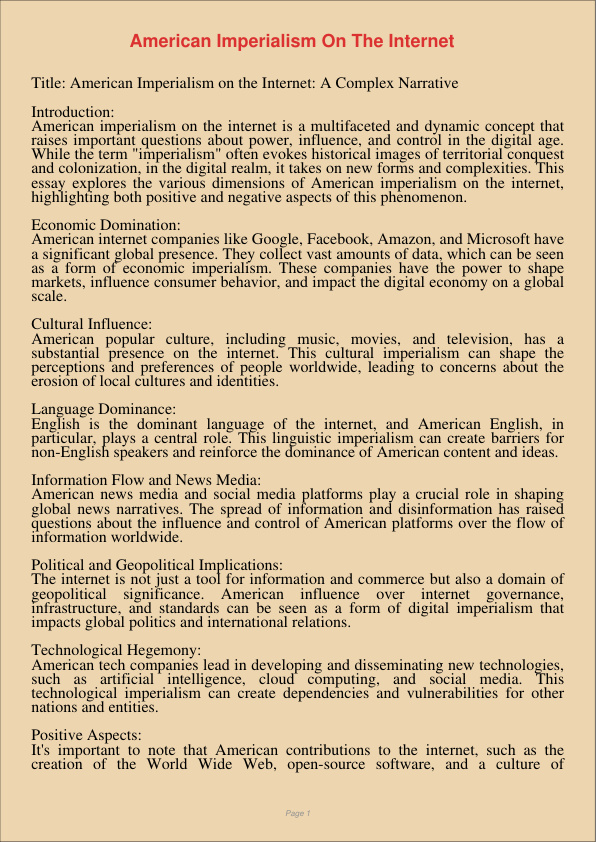American Imperialism On The Internet
Jan 9, 2024
american imperialism
internet
Education
Philosophy
Title: American Imperialism on the Internet: A Complex Narrative
Introduction: American imperialism on the internet is a multifaceted and dynamic concept that raises important questions about power, influence, and control in the digital age. While the term “imperialism” often evokes historical images of territorial conquest and colonization, in the digital realm, it takes on new forms and complexities. This essay explores the various dimensions of American imperialism on the internet, highlighting both positive and negative aspects of this phenomenon.
Economic Domination: American internet companies like Google, Facebook, Amazon, and Microsoft have a significant global presence. They collect vast amounts of data, which can be seen as a form of economic imperialism. These companies have the power to shape markets, influence consumer behavior, and impact the digital economy on a global scale.
Cultural Influence: American popular culture, including music, movies, and television, has a substantial presence on the internet. This cultural imperialism can shape the perceptions and preferences of people worldwide, leading to concerns about the erosion of local cultures and identities.
Language Dominance: English is the dominant language of the internet, and American English, in particular, plays a central role. This linguistic imperialism can create barriers for non-English speakers and reinforce the dominance of American content and ideas.
Information Flow and News Media: American news media and social media platforms play a crucial role in shaping global news narratives. The spread of information and disinformation has raised questions about the influence and control of American platforms over the flow of information worldwide.
Political and Geopolitical Implications: The internet is not just a tool for information and commerce but also a domain of geopolitical significance. American influence over internet governance, infrastructure, and standards can be seen as a form of digital imperialism that impacts global politics and international relations.
Technological Hegemony: American tech companies lead in developing and disseminating new technologies, such as artificial intelligence, cloud computing, and social media. This technological imperialism can create dependencies and vulnerabilities for other nations and entities.
Positive Aspects: It’s important to note that American contributions to the internet, such as the creation of the World Wide Web, open-source software, and a culture of innovation, have had positive global impacts, fostering collaboration and economic growth.
Challenges and Criticisms: Critics argue that American imperialism on the internet can lead to the concentration of power, the erosion of privacy, and the potential for exploitation by both government and corporate entities. There are concerns about surveillance, data breaches, and censorship.
Conclusion:
American imperialism on the internet is a complex and evolving phenomenon. While it offers many benefits, it also raises important ethical, cultural, and political questions. Striking a balance between harnessing the positive aspects of American contributions to the digital realm and addressing the challenges and criticisms will be a key task for individuals, organizations, and governments worldwide. As the internet continues to shape our interconnected world, understanding and navigating these complexities will be vital for the global community.
